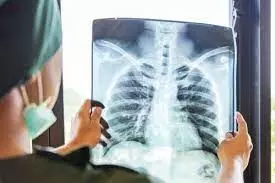
Identification and Management of Depression in TB-infected Individuals
text_fieldsIt is a matter of great pride that in the march towards the total elimination of tuberculosis (TB), the southern state of Kerala has been a beacon of light. When compared to other states the number of individuals who get infected with TB and those who succumb to it is considerably less.
But it is ironic that a state with a 100% literacy rate still faces stigma when it comes to dealing with infectious diseases. TB is no stranger to that. Recently there had been a lot of discussions in the press concerning the presence of mental health issues as one of the major comorbidities of TB. Among them, depression, anxiety and even psychotic disorders have been discussed.
Of these, depression is amongst the most common comorbidities- possibly due to its high prevalence rate among mental disorders as such. In a recent meta-analysis, the prevalence of depression in TB patients was found to be 45.17%. Both TB, as well as mental illness, are highly stigmatised and as a result of which help-seeking does get affected for both diseases. This can in turn contribute to poor prognosis for both.
*Depression in Individuals with TB
The recent pandemic of Covid 19 had brought with it an insight into the importance of addressing our mental health issues as well, with people realizing that health includes taking care of one’s mental health too. From a stage where depression was believed to be something to be “shaken out of” or “something found only in the western culture/ western fad”, families have started having more open discussions about the same.
There is no hiding the fact that there is a very long way to go still. There had been a plethora of studies indicating the presence of anxiety and depression during the Covid lockdown periods with people becoming more willing to engage in addressing the same. One reason for the increased prevalence rates during the pandemic might be due to the presence of already existing mental health issues which was not addressed or were swept under the carpet when coupled with the stress of living with a pandemic might have made it all the more difficult to deny it.
Moreover, influential people or celebrities coming out with stories of how they braved the battle with their mental health issues has also helped to a certain extent.
When it comes to TB, recent studies from the district Ernakulam in Kerala have reported the prevalence of depression to be 16.1% with a higher proportion of individuals in the age group of 18 to 40 years. The study further concluded that one-sixth of TB patients suffered from depression ( Retnakumar & George, 2022).
*Possible Risk Factors for Depression in TB
In some patients with TB, there is a higher possibility to develop depressive symptoms. Along with Tb, if there are other physical comorbidities like the presence of Diabetes, then the chances for them to develop depression would be even higher.
Lack of a social support system and perceived stigma were two important risk factors contributing to depression in individuals with TB. Other comorbidities like HIV infection and alcoholism can also contribute to it. Psychosocial factors like inadequate social support, marital status, low levels of education, female gender, rural residence, and retreatment case status are the other possible risk factors.
Even today, a patient with TB has to deal with misconceptions about the disease – concerning its spread and its treatment. There are several myths which prevail regarding the reasons for any individual contracting the disease. Some still believe it to be an incurable disease which will be spread to everyone who interacts with them. Individuals, once diagnosed with TB face ostracization from their very own kith and kin as well.
All these results in them being isolated from their family, neighbours, workplaces as well as from other social situations. Women face the greater brunt with fear of being rejected when it comes to marriage, fear that their partners might divorce them or the in-laws might not approve. They also fear being isolated at their workplaces for fear of infecting others. Previously undiagnosed /unaddressed mental health issues might also exacerbate the distress.
*Symptoms of Depression in Individuals with TB
The criteria for diagnosing depressive symptoms, in general, do apply to TB as well. Long-standing/chronic illness does carry the risk of developing anxiety/depressive symptoms over time.
Difficulties /disturbances in sleep as not getting a rested feeling or waking up earlier than usual and then having difficulty getting back to sleep
Getting angry over trivial things
Not able to enjoy any activities which used to be enjoyable previously.
Considerable feelings of sadness throughout the day with/without spells of crying
Significant guilt feelings- ruminating about the possible reason as to how or why they must have contracted the disease and blaming themselves for the same.
Lack of energy in carrying out daily activities or feeling lethargic
Difficulties in concentrating on anything- be it in reading papers/studying / any job-related tasks.
Lethargic and slow in thinking as well as in action- taking a long time to do usual day-to-day work, being slow in activities, feeling like forgetting everything sooner than before.
Feeling hopeless about the current situation and the future/ pessimistic about the outcome of the disease/ feeling like a burden to the family.
Withdrawing from others / not interacting with others/ difficulty with facing others in a social situation/ feelings of isolation from others which may be perceived as well as self-imposed.
Thoughts of self-harm or suicidal thoughts/ feeling hopelessness
*Management of Depression in Individuals with TB
It is very important to identify and treat depression in patients with Tb as it has the potential to interfere with medication adherence which in turn affects the prognosis. Today there are medications which may be safely used along with the medications for managing TB. The medicines will not in any way affect or interact with the medicines which are used for TB. The medicines work on restoring the equilibrium of neurotransmitters such as serotonin and norepinephrine and for that, a period of 6 to 9 months is recommended. Once these medications are used, symptoms improve leading to better health which in turn aids in the treatment of TB as well. If left untreated, this can lead to lowered immunity which will negatively affect the management of TB.
In some cases, the medicines used for the management of TB are causing mental health issues. One such drug is the I.N.H. drug which is used in the management of TB. The resulting condition is called drug-induced psychosis- which can have both depressive as well as psychotic features.
All these can be managed effectively by the use of medications. A very rare condition can also be observed in some patients in whom Tb affects the brain called cerebral tuberculosis. In such conditions too along with the pharmacological management of TB, management for the behavioural issues too should be initiated.
Proper counselling and psychotherapy in the initial stages can also help individuals with TB tide over their depressive symptoms. Interacting with individuals who have overcome TB can go a long way in helping them understand the symptoms better and ways of coping. Managing stress levels with relaxation techniques and stress reduction methods along with training on good sleep hygiene can be taught to them.
Proper psychoeducation concerning both TB as well as depression can go a long way in eradicating misconceptions about the diseases. Educating about the need for medication adherence can be vital.
Following a structured physical activity programme is highly effective in reducing depressive symptoms. Educating family members about the need for continued therapy for both conditions should be emphasized. Intervening with the family members will also help in relapse prevention by addressing the expressed emotions which can be in the form of critical comments or over- involvement which can negatively affect the patients with depression.
Families with highly expressed emotions tend to be hostile, and overly critical and can show intolerance towards the patient. Involving family members in the therapeutic process can help reduce it thus reducing the chances of a relapse. Thus managing mental health issues can help in alleviating depressive symptoms and in bringing the goal of total eradication of TB to fruition.
Credits to:
● Dr Arun B Nair
(Professor, Department of Psychiatry, Medical College, Thiruvananthapuram)
● Dr Soji Anna Philip
(Consultant-Clinical Psychologist -Kochi)






















